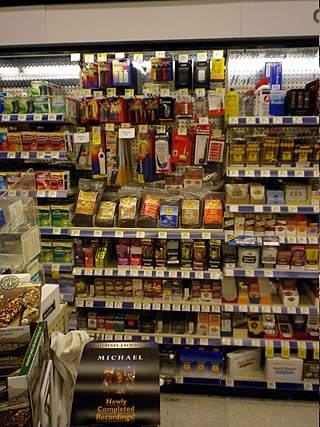
A debit card, also known as a check card or bank card is a payment card that can be used in place of cash to make purchases. The term plastic card includes the above and as an identity document. These are similar to a credit card, but unlike a credit card, the money for the purchase must be in the cardholder's bank account at the time of a purchase and is immediately transferred directly from that account to the merchant's account to pay for the purchase.

A pawnbroker is an individual or business that offers secured loans to people, with items of personal property used as collateral. The items having been pawned to the broker are themselves called pledges or pawns, or simply the collateral. While many items can be pawned, pawnshops typically accept jewelry, musical instruments, home audio equipment, computers, video game systems, coins, gold, silver, televisions, cameras, power tools, firearms, and other relatively valuable items as collateral.
In business or commerce, an order is a stated intention, either spoken or written, to engage in a commercial transaction for specific products or services. From a buyer's point of view it expresses the intention to buy and is called a purchase order. From a seller's point of view it expresses the intention to sell and is referred to as a sales order. When the purchase order of the buyer and the sales order of the seller agree, the orders become a contract between the buyer and seller.
Right of first refusal is a contractual right that gives its holder the option to enter a business transaction with the owner of something, according to specified terms, before the owner is entitled to enter into that transaction with a third party. A first refusal right must have at least three parties: the owner, the third party or buyer, and the option holder. In general, the owner must make the same offer to the option holder before making the offer to the buyer. The right of first refusal is similar in concept to a call option.

Carlill v Carbolic Smoke Ball Company [1892] EWCA Civ 1 is an English contract law decision by the Court of Appeal, which held an advertisement containing certain terms to get a reward constituted a binding unilateral offer that could be accepted by anyone who performed its terms. It is notable for its treatment of contract and of puffery in advertising, for its curious subject matter associated with medical quackery, and how the influential judges developed the law in inventive ways. Carlill is frequently discussed as an introductory contract case, and may often be the first legal case a law student studies in the law of contract.

A receipt is a document acknowledging that a person has received money or property in payment following a sale or other transfer of goods or provision of a service. All receipts must have the date of purchase on them. If the recipient of the payment is legally required to collect sales tax or VAT from the customer, the amount would be added to the receipt, and the collection would be deemed to have been on behalf of the relevant tax authority. In many countries, a retailer is required to include the sales tax or VAT in the displayed price of goods sold, from which the tax amount would be calculated at the point of sale and remitted to the tax authorities in due course. Similarly, amounts may be deducted from amounts payable, as in the case of taxes withheld from wages. On the other hand, tips or other gratuities that are given by a customer, for example in a restaurant, would not form part of the payment amount or appear on the receipt.

The posting rule is an exception to the general rule of contract law in common law countries that acceptance of an offer takes place when communicated. Under the posting rule, that acceptance takes effect when a letter is posted ; the post office will be the universal service provider, such as the UK's Royal Mail, the Australia Post, or the United States Postal Service. In plain English, the "meeting of the minds" necessary to contract formation occurs at the exact moment word of acceptance is sent via post by the person accepting it, rather than when that acceptance is received by the person who offered the contract.

Offer and acceptance are generally recognised as essential requirements for the formation of a contract, and analysis of their operation is a traditional approach in contract law. The offer and acceptance formula, developed in the 19th century, identifies a moment of formation when the parties are of one mind. This classical approach to contract formation has been modified by developments in the law of estoppel, misleading conduct, misrepresentation, unjust enrichment, and power of acceptance.

Alliance Boots was a multinational pharmacy-led health and beauty group with corporate headquarters in Bern, Switzerland and operational headquarters in Nottingham and Weybridge, United Kingdom.

Partridge v Crittenden [1968] 1 WLR 1204 is an English case, which was heard by the Divisional Court of the Queen's Bench Division of the High Court of England and Wales on appeal from Chester magistrates' court, and is well known for establishing the legal precedent in English contract law that advertisements are usually considered to be invitations to treat.

Butler Machine Tool Co Ltd v Ex-Cell-O Corp (England) Ltd [1977] EWCA Civ 9 is a leading English contract law case. It concerns the problem found among some large businesses, with each side attempting to get their preferred standard form agreements to be the basis for a contract.

Fisher v Bell [1961] 1 QB 394 is an English contract law case concerning the requirements of offer and acceptance in the formation of a contract. The case established that, where goods are displayed in a shop, such display is treated as an invitation to treat by the seller, and not an offer. The offer is instead made when the customer presents the item to the cashier together with payment. Acceptance occurs at the point the cashier takes payment.
Merchant services is a broad category of financial services intended for use by businesses. In its most specific use, it usually refers to merchant processing services that enables a business to accept a transaction payment through a secure (encrypted) channel using the customer's credit card or debit card or NFC/RFID enabled device. More generally, the term may include:

A pharmacy is a retail shop which provides pharmaceutical drugs, among other products. At the pharmacy, a pharmacist oversees the fulfillment of medical prescriptions and is available to counsel patients about prescription and over-the-counter drugs or about health problems and wellness issues. A typical pharmacy would be in the commercial area of a community.

A credit card is a payment card issued to users (cardholders) to enable the cardholder to pay a merchant for goods and services based on the cardholder's accrued debt. The card issuer creates a revolving account and grants a line of credit to the cardholder, from which the cardholder can borrow money for payment to a merchant or as a cash advance. There are two credit card groups: consumer credit cards and business credit cards. Most cards are plastic, but some are metal cards, and a few gemstone-encrusted metal cards.

In English contract law, an agreement establishes the first stage in the existence of a contract. The three main elements of contractual formation are whether there is (1) offer and acceptance (agreement) (2) consideration (3) an intention to be legally bound.

An invitation to treat is a concept within contract law which comes from the Latin phrase invitatio ad offerendum, meaning "inviting an offer". According to Professor Andrew Burrows, an invitation to treat is
an expression of willingness to negotiate. A person making an invitation to treat does not intend to be bound as soon as it is accepted by the person to whom the statement is addressed.

The Indian Contract Act, 1872 prescribes the law relating to contracts in India and is the key act regulating Indian contract law. The Act is based on the principles of English Common Law. It is applicable to all the states of India. It determines the circumstances in which promises made by the parties to a contract shall be legally binding. Under Section 2(h), the Indian Contract Act defines a contract as which is sex by law.

A tobacco-free pharmacy is a retail pharmacy where the sale of tobacco products is not available. Outside the United States, it is illegal in countries such as in France and most of Canada for pharmacy stores to sell cigarettes and similar products on the same premises as over-the-counter drugs and prescription medication. Anti-tobacco campaigners advocate the removal of tobacco from pharmacies due to the health risks associated with smoking and the apparent contradiction of selling cigarettes alongside smoking cessation products and asthma medication. Some pharmaceutical retailers counter this argument by reasoning that by selling tobacco, they are more readily able to offer to customers advice and products for quitting smoking.

Boots UK Limited, trading as Boots, is a British health and beauty retailer and pharmacy chain in the United Kingdom and other countries and territories including Ireland, Italy, Norway, the Netherlands, Thailand and Indonesia.